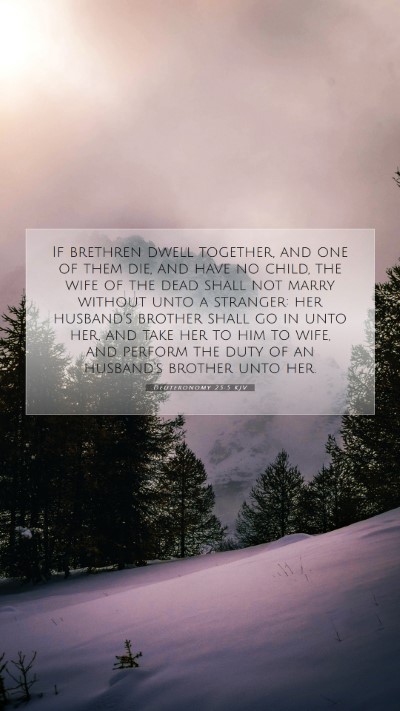Bible Verse Meaning: Deuteronomy 25:5
Verse: “If brothers dwell together, and one of them die, and have no child, the wife of the dead shall not marry without unto a stranger: her husband's brother shall go in unto her, and take her to him to wife, and perform the duty of an husband's brother unto her.” (Deuteronomy 25:5)
Understanding the Context: In this passage, God provides laws that aim to protect family lineage and ensure the continuation of a deceased brother's name. The practice described is known as levirate marriage, where a man is obligated to marry his deceased brother's widow if the brother died without leaving children. This law is rooted in ancient societal customs where family name and inheritance were paramount.
Insights from Public Domain Commentaries
Matthew Henry's Commentary
Matthew Henry emphasizes that this commandment served a dual purpose: to maintain family ties and preserve the inheritance rights of the deceased. The wife was not to suffer loss or disgrace but was to be cared for by her husband's relative. Such a law illustrates God’s deep concern for human relations and the welfare of individuals within family units.
Albert Barnes' Notes
Albert Barnes explains that the practice was a protection for widows, ensuring they would not be left destitute or without support. The brother-in-law’s obligation to marry the widow was significant as it not only honored the deceased but brought forth a new lineage. This was an essential practice in setting the foundations for future generations under God’s covenant.
Adam Clarke's Commentary
Adam Clarke posits that such statutes show the gravity of family responsibilities in Jewish law. The husband should fulfill his duty to take the widow in marriage, which highlights the moral and spiritual obligations imposed on family members to support one another. Clarke sees this decree as part of the overarching theme of love and fidelity within the covenant community.
Significance and Application
This verse illustrates several critical themes in Biblical exegesis:
- The Importance of Family: The laws emphasize family loyalty and continuity among God's people.
- Protection for the Vulnerable: The widow represents those in society who may be marginalized. This law acts as a form of social justice.
- Divine Order: The expectation placed upon the brother-in-law signifies the structure and order that God desires in interpersonal relationships.
Bible Study Insights
For those engaging in Bible study resources, Deuteronomy 25:5 can be dissected for its historical and cultural implications, allowing for deeper understanding of levirate customs and their significance in ancient Israel.
Related Bible Cross References
- Genesis 38:8 - The account of Judah and Tamar, where a similar principle is illustrated.
- Ruth 4:1-10 - The story of Boaz and Ruth, showcasing the practice of redeeming family rights.
- Matthew 22:24-28 - Jesus references the levirate marriage in his discussions about resurrection.
Conclusion
In summary, Deuteronomy 25:5 provides rich material for anyone seeking a thorough understanding of Scripture. It serves as a reminder of the cultural contexts that shape Biblical laws and illustrates God's plan for relational integrity among His people. Through Bible verse interpretations like this one, readers can gain valuable Bible study insights applicable to both historical understanding and present-day ethical considerations.


